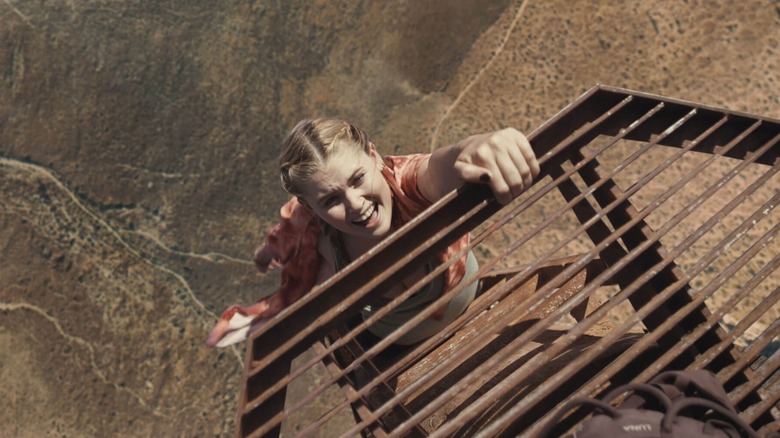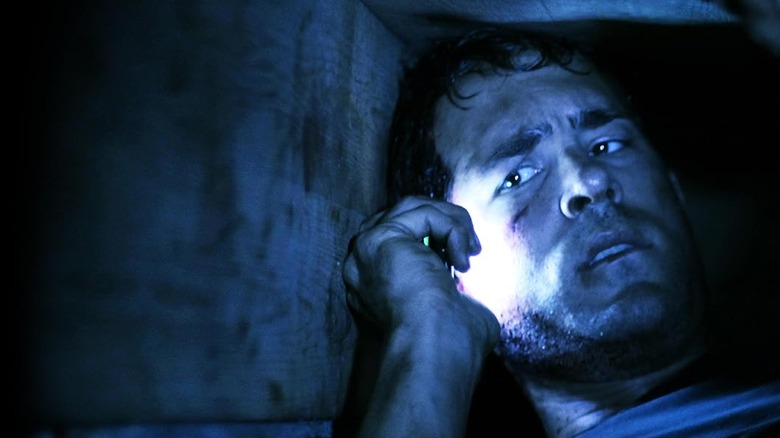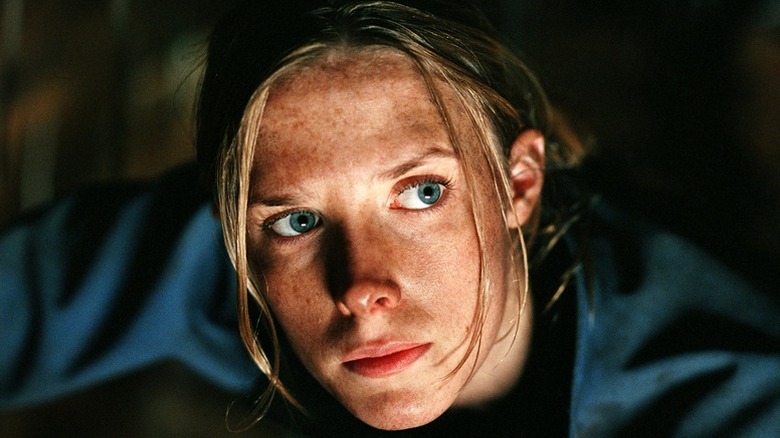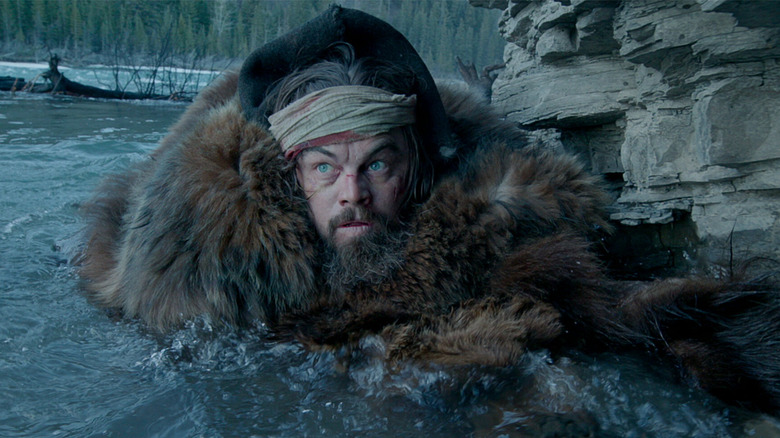12 Movies Like Fall That Are Genuinely Terrifying
In 2022, director Scott Mann took audiences to such a high point they almost didn't want to come down. The movie was called "Fall," and it is a brilliantly isolated thriller that sees two best friends stuck at the top of a broadcasting tower when the ladder they used to climb up is no longer there to get them back to solid ground.
It's this kind of premise, basic as it is, that has often left audiences hooked until the very last frame. To see one or two people enter panic mode and then go to great lengths to make sure they walk away from their massive mishap is something that will always keep us on the edge of our seats until we fall off it. Or we could see them make one bad misstep that can cost them dearly.
With that in mind, here's an eclectic list of alternatives to get stuck into after you've landed from "Fall." Movies that will have you braving elements, unhinged enemies, and even forces that frankly aren't of this world at all. Don't get lost. Or do? The choice really is up to you.
Buried
Long before Ryan Reynolds was cracking audiences up as the Merc with the Mouth in the "Deadpool" franchise, his larger-than-life character was confined to a 6-foot-by-3-foot-by-18-inch crate that he couldn't escape from. Directed by Rodrigo Cortés, "Buried" follows Reynolds as Paul, an American truck driver stationed in Iraq, who wakes up to find himself buried in an undisclosed location with only a limited oxygen supply and time running out.
It's another rare one-man show, with Reynolds wrapped in darkness and his own panic as supporting talent checks in via the Blackberry (remember them?) he's been left with and only a Zippo lighter illuminating the frame. While there's no doubt that Reynolds is now a megastar with his whip-smart comedic timing and charm making him such a big name in Hollywood, this is a film worth visiting if only to see how he got there.
Some impressive cinematography from Eduard Grau does a good job of dressing up a film that's basically Reynolds lying down for 95 minutes, doing everything he can to get himself up and out of the horror he's found himself in. Naturally those fearful of enclosed spaces might want to give this a miss, but anyone interested in seeing the man behind Wade Wilson before he built his career around d*** jokes and dressed-up F-bombs might want to give one of Reynolds' most underrated movies a look.
The Descent
From one deep dark tale to another — which throws in some monstrous additional elements for good measure — Neil Marshall's "The Descent" is one of the more fantastical entries on this list but that doesn't stop it from being any more frightening with its sense of isolation and unsettling creature feature add-ons. The 2005 horror film sees an all-female group of thrill-seekers go exploring in an unmarked cave, only to get trapped and find something inhuman waiting for them in the darkness.
Understandably, following Marshall's cult hit werewolf film, "Dog Soldiers," audiences anticipated finding something monstrous down in the depths. But the real highlight of Marshall's thriller is the terror formed in the tight spaces he forces his characters into early on. It might just be "a poxy cave," but before the beasties start closing in, the walls they crawl out of have already done enough.
Every carefully lit nook and dark corner of the screen helps amplify the stress levels so that when the blood starts spilling, it's pumping at a high rate. And who can forget the brilliantly bleak ending of "The Descent," which closes things off nicely and absolutely doesn't warrant a sequel at all, even if it did get one four years later?
Vertical Limit
Every so often a director will plant a flag in a big-budget mountain movie and in 2000, "GoldenEye" and "Casino Royale" director Martin Campbell did it with "Vertical Limit." Chris O'Donnell, Scott Glenn, and a then-unknown Ben Mendelsohn play members of a ragtag rescue team that climbs K2 in search of Peter Garrett's (O'Donnell) sister, who has gone missing with another group.
Braving the elements and using explosive methods to get there, the film follows a nail-biting path with Bill Paxton in spectacular weasel mode as Elliot Vaughn, the smug billionaire who isn't the cool philanthropist he's making himself out to be.
Kicking things off with a killer opening that does a great job of setting the movie's tone, "Vertical Limit" spends the rest of the film having its brave rescuers get snuffed out one by one courtesy of Mother Nature. Legs are broken, falls are taken, and Peter runs for his life from seasoned climber Montgomery Wick (Glenn), the bitter veteran with a score to settle who spouts lines like, "Up there you're not dying, you're dead." It might feel a bit dated now, but sometimes you just need Ben Mendelsohn yelling as an angry mad Australian while the original "Man on Fire" lowers the atmosphere to ridiculously cool temperatures.
A Lonely Place To Die
Taking the classic tropes of a survival movie and chipping away at an interesting thriller in the process, "A Lonely Place To Die" sees Melissa George among a group of mountaineers who discover a small girl buried alive in the Scottish Highlands. Unfortunately, the men who put her there soon come after her rescuers, leading to a fight for survival and George's protagonist trying to avoid getting caught in the middle of seedy criminal dealings.
It might stretch its drama further than a radio tower, but there's something about the treacherous Scottish Highlands and how director Julian Gilbey maneuvers along them that makes "A Lonely Place to Die" not easy to pass by.
George — after turns in films like "Triangle" and "30 Days of Night" — gets another stab at a moody thriller that she thrives in by the end. Include the perma-chilled presence of Sean Harris (better known as Solomon Lane in the "Mission: Impossible" movies) and "A Lonely Place to Die" might be one of the most underrated films on this list — and one that actually deserves seeking out.
Phone Booth
Phone booths might be an endangered form of communication but Joel Schumacher's 2002 thriller, which spends most of its runtime with Colin Farrell in one, will have you hooked. The current Penguin — and Oscar-nominated actor — plays New York City talent agent Stu Shepard, who makes a bad call when he answers the phone to a sniper with his sights trained on the booth.
From there, "Phone Booth" has all eyes on Farrell as Kiefer Sutherland's rasp snakes down the line, keeping our hero on the spot and wrecking his life in the process. With cop Ed Ramey (Forest Whitaker), Stu's mistress Pam (Katie Holmes), and his wife Kelly (Radha Mitchell) all putting their lives on the line to get close to the unnamed caller, Schumacher does an exceptional job of building the suspense. He makes dressing up in a phone booth better than Clark Kent does when he needs a costume change.
Having it happen in a hectic spot like Times Square only adds to the frenetic tension while still keeping the film's leading man confined to four glass walls and a phone line. Given Farrell's recent resurgence courtesy of "The Banshees of Inisherin," "The Lobster," and his time in Gotham City, this is a great example to see some of his early work and the great job he did with it.
Free Solo
If you think "Fall" had you biting your nails, try watching a film about a guy who practically depends on them to survive incredible climbs that'll have you gasping for air. Elizabeth Chai Vasarhelyi and Jimmy Chin's Oscar-winning documentary "Free Solo" tells the story of Alex Honnold, a mountain climber who aims to free solo climb El Capitan in California's Yosemite Park. With no harnesses and only his own body to push to the limits, Honnold tries to do the unthinkable while his friends and his partner at the time, Sanni McCandless, look up in dread, monitoring his every move.
Every reach for a jagged ledge and tippy-toe that finds itself a place is brilliantly and meticulously displayed, making you honestly feel like you're watching someone's imminent demise on film. In between those chest-pounding moments, though, time is spent gaining a fascinating insight into how Honnold's obsession with the unthinkable consumes him. The venture takes its toll on his now-wife, Sanni, who reaches her breaking point even before he's taken the climb. But in the end, this is a tale that grips you with its reality and won't let go until it makes its one final reach to the top.
The Revenant
Another tale of willpower and lone determination, "The Revenant" is Alejandro G. Iñárritu's relentless and chilling thriller that sees Leonardo DiCaprio as fur trapper Hugh Glass, crawling back from the brink after suffering a tragedy and being left for dead. Through Emmanuel Lubezki's stunning lens, every bit of natural light — and an angry CGI bear — is used to their full potential in bringing this bleak and brutal revenge story to life.
The behind-the-scenes horror stories will remain as iconic as the film itself: DiCaprio was reportedly never the same after filming, having eaten raw meat to depict his character doing anything he can to survive and exact his revenge. Meanwhile, Tom Hardy applies the hairy, thuggish presence of John S. Fitzgerald, who double-crosses Glass and lives to regret it. You may watch through your fingers as our hero get thrown violently around in that unflinching bear attack, but after that, take in what is a true movie marvel that deserves all the praise it received.
Crawl
Even when he's not behind the camera or writing the script, horror icon Sam Raimi has helped to usher in a number of modern classics of the genre just as a producer. One such instance of that is 2019's "Crawl," produced by Raimi and directed by Alexandre Aja.
Like "Fall," it revolves primarily around two people stuck in a deadly situation — in this case, college student Haley (Kaya Scodelario) and her father Dave (Barry Pepper), who find themselves trapped in the crawlspace of their house during the onslaught of a hurricane. A scary enough situation already, it's made significantly more dangerous given that hurricane waters are not only flooding the house but have brought alligators onto the premises as well.
"Crawl" was critically acclaimed upon release, and was nominated for not only specialty awards like the Fangoria Chainsaw Awards but also by the Hollywood Critics Association and the National Film and Television Awards. In addition to nominations for the movie itself, Scodelario got her own nomination for her performance, as did the movie's stunt team — though the latter lost to "John Wick 4" (which is hard to really argue with). A sequel was greenlit in August 2024, with Aja returning to direct and Raimi once again producing.
127 Hours
Based on a true story, "127 Hours" occupies a unique moment in history in terms of technology and what it meant for the victim at the center of the film. The use of phones, and their connectivity to the internet, obviously play heavily into "Fall." But in 2003, when Aron Rolston — played in the film by James Franco — went hiking alone in the desert, mobile phones hadn't quite reached the ubiquity they were soon destined for. So as easy as it was to say he was being careless by venturing out alone without his phone, it wasn't that unusual at that time.
However, what makes the historical moment unique is that handheld digital cameras were quite common in 2003. So Rolston did have a handheld camera, with which he documented the horrifying ordeal of becoming trapped in a canyon with his arm lodged between a literal rock and a hard place. This allowed for the movie to follow the trend of thrillers that are told from the POV of a person's camera, while also acknowledging that the camera is not part of a phone which the subject should have been using to try and call for help.
As with "Fall," the lack of any monsters, supernatural elements, or even exaggerated natural dangers give "127 Hours" that extra level of terror that can only come with movies that feel entirely believable and like they could really happen — and in this case, it did really happen.
Cast Away
A movie doesn't have to be classified as a horror movie, a thriller, or even a suspense film to be utterly terrifying. Such is the case with "Cast Away," in which Tom Hanks play a FedEx employee named Chuck Noland who finds himself stranded alone on a deserted island after a plane crash. Again, there aren't creatures and the island isn't haunted — none of that sort of thing. Like "Fall," it's a movie that gets the spine tingling entirely because it's about a real person who finds his life in danger when he becomes trapped in an entirely grounded, real-world situation.
There is no shortage of movies and TV shows centered around the common human fear of becoming trapped on a deserted island. But many, if not most, of them resort to having monsters inhabit the island, having the island being controlled or overseen by a sinister organization, or making the island actually something else entirely. Where "Cast Away" succeeds is that it doesn't give into any such gimmickry. It's just a man trying to survive on an island, alone, with dwindling resources and deteriorating physical and mental health. The tour de force, Oscar-nominated performance by Hanks, in his everyman persona, only serves to make the scenario that much more identifiable — and therefore, that much scarier.
Open Water
"Open Water" is definitely a contender for "most famous horror movie based on real events," even if — like fellow nominee for that distinction "The Texas Chain Saw Massacre" — it's one of those true story movies that lied to you given all the liberties it takes with the actual story. What is confirmed is that a scuba diving couple got separated from their group and found themselves stranded in shark-infested waters, never to be seen or heard from again. As far as what they went through in the time between their last contact with anyone else and the ultimate loss of their lives, that will forever be relegated to the realm of conjecture.
"Open Water" theorizes that the couple were terrorized, and ultimately eaten by, ravenous sharks. Whether it's disrespectful to use a tragedy like this as the basis for a shark attack movie is definitely a viable discussion to have. But taking it at face value as a horror movie, "Open Water" is incredibly effective at what it sets out to do. Like the best shark movies, it spends the bulk of its runtime building the tension of the inevitable attack, rather than depicting a shark or group of sharks going on a killing spree. "Jaws" will forever remain the king of the genre, but in most lists of best shark movies besides or since "Jaws," "Open Water" is not only consistently included but usually ranked highly.
Frozen
Three years before the title "Frozen" was associated with Disney princesses and ice powers, it was the name of a 2010 horror film about three people trapped on a stalled ski lift after some miscommunication during a shift change. They are too high to safely land on the ground below, and once the sun sets, the snow gear they are wearing will prove insufficient in protecting them from the overnight weather conditions. The mood quickly becomes desperate, especially after the first of the trio rolls the dice on jumping off to disastrous results.
In her review of "Frozen" for the New York Times, Jeannette Catsoulis wrote, "A minimalist setup delivers maximum fright" — a description that could easily have been written about "Fall" as well. Reviews for the cold weather chiller at the time were lukewarm overall, but those who liked "Frozen" seemed to be particularly positive about it. In the years since its release, it has slowly built up a following as an underrated cult classic, particularly among horror-centric outlets that have tried to boost the film's reputation with glowing write-ups and inclusion in various best-of lists.












